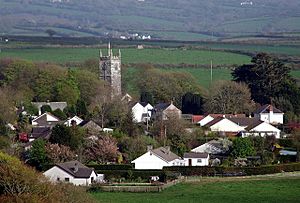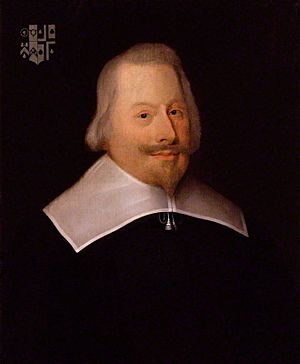Anthony Nicholl facts for kids
Quick facts for kids
Anthony Nicholl
|
|
|---|---|

St Tudy, Nicholl's birthplace
|
|
| Sheriff of Cornwall | |
| In office 1656 – 1658 † |
|
| Member of Parliament for Cornwall |
|
| In office 1654 – 1658 † |
|
| Master of the Armoury | |
| In office 1648 – 1658 † |
|
| Member of Parliament for Bodmin |
|
| In office 1640 – 1648 (suspended) |
|
| Member of Parliament for Bossiney |
|
| In office April 1640 – May 1640 |
|
| Personal details | |
| Born | 14 November 1611 Penvose, St Tudy, Cornwall, England |
| Died | February 20, 1658 (aged 46) London, England |
| Resting place | Savoy Chapel |
| Spouse | Amey Speckett (1629–1685) |
| Relations | John Pym (uncle) |
| Children | 9 |
| Parents | Humphrey Nicoll (1577–1643) Philippa Rouse (died 1669) |
| Occupation | Politician |
Anthony Nicholl (born November 1611 – died February 1658) was an English politician. He was a close friend and helper of important Parliamentary leaders. These leaders included John Pym and John Hampden.
After the First English Civil War ended in 1646, there were many political struggles. In July 1647, senior army officers accused Nicholl and ten other members of Parliament. They said these "Eleven Members" were trying to cause trouble in the country.
Nicholl was suspended from Parliament in January 1648. He was later allowed back, but then expelled again in December 1648. This event was called Pride's Purge. He returned to Parliament in 1654. In 1656, he became the High Sheriff of Cornwall. He passed away in London in February 1658.
Contents
Who Was Anthony Nicholl?
Anthony Nicholl was born on November 14, 1611. He was one of many children of Humphrey Nicholl and Philippa Rouse. His family was part of the gentry in Cornwall. The gentry were a group of wealthy landowners.
His mother, Philippa Rouse, was the half-sister of John Pym. Pym was a very important leader in Parliament. Nicholl's family had lived in Cornwall for a long time. They were descendants of Oto Nicoll, who came from Guernsey in the 1400s.
Nicholl's Family Life
Anthony Nicholl married Amey Speckett. Her family came from Thornbury, Devon. Anthony and Amey had nine children together. They had five sons and four daughters.
After Anthony died, Amey married another local landowner. His name was John Vivian.
Nicholl's Political Journey

Anthony Nicholl's father was a strong opponent of King Charles I. He disagreed with the King's "Forced Loan" in 1627. This loan was a major reason for the conflict between the King and Parliament. This conflict eventually led to the King ruling alone, known as "Personal Rule."
Both Anthony and his father supported the Presbyterian group in the House of Commons. This group was led by their relative, John Pym.
Becoming a Member of Parliament
In April 1640, Anthony Nicholl was elected as a MP for Bossiney. However, King Charles I closed Parliament just a month later.
New elections were held in November 1640. Nicholl was then elected as an MP for Bodmin. He served in this Parliament, which was called the "Long Parliament," until 1660.
John Pym chose Nicholl to observe the trial of Thomas Wentworth in March 1641. Wentworth was a powerful figure who was accused of treason.
Role in the English Civil War
When the First English Civil War started in August 1642, many Cornish landowners supported the King. However, the Nicholl family chose to support Parliament.
In September 1642, the King's supporter, Francis Bassett, was Sheriff of Cornwall. He forced the Nicholls and other Parliament supporters out of the county.
In February 1643, Parliament's supporters in Cornwall and Devon made a local truce with the King's forces. This made people in London very angry. Nicholl was sent to Exeter to tell his colleagues that this truce was not allowed. He told them not to make any more agreements.
In May 1643, Nicholl was present at the Battle of Stratton. This was a victory for the King's forces. It gave them control of the West Country. Nicholl's own lands were taken over by the King's forces until the war ended. In June 1645, Parliament gave him financial help.
Challenges and Return to Power
Nicholl's close friend, John Hampden, died in June 1643. He was wounded at the Battle of Chalgrove Field. Nicholl wrote that the country had lost a great person. He also said he had lost a true and loyal friend. His uncle, John Pym, died in December 1643.
The Parliamentary commander at Stratton, Henry Grey, blamed Nicholl for his defeat. He filed charges against Nicholl. But Nicholl successfully proved his innocence. The charges were dropped in May 1644.
After the war ended in June 1646, Nicholl became a leader against Oliver Cromwell. In July 1647, he was one of the "Eleven Members" accused by senior army officers. They claimed he was trying to cause trouble in the country. The Eleven Members left Parliament. Nicholl was allowed to go back to Cornwall.
On August 17, he was arrested on his way home. He was taken to the army's headquarters. But he was quietly allowed to escape a few days later. The legal action against the Eleven Members was stopped when the Second English Civil War began in February 1648. It was completely dropped in June. As a sign of peace, Nicholl was given the job of Master of the Armoury. This was a job that paid well but didn't require much work.
Later Political Life and Death
The defeat in the Second English Civil War weakened the Presbyterian group. Nicholl was among those expelled from Parliament in 1648. This event was called Pride's Purge.
Later, he made peace with the new government. In 1654, he was elected as an MP for Cornwall. He was re-elected in 1656. From 1655 to 1657, during the "Rule of the Major-Generals," he advised the government for the South-West region.
In 1657, he was appointed High Sheriff of Cornwall. He regularly sent updates to John Thurloe. Thurloe was the head of intelligence under the Protectorate.
Anthony Nicholl died in London in February 1658. He was buried in the graveyard of the Savoy Chapel. In 1681, his wife, Amey, put up a family memorial. It was in the church of St Tudy in Cornwall. The memorial remembers Anthony, Amey, and four of their sons. These sons died between 1649 and 1678.
Images for kids
See Also
 | James Van Der Zee |
 | Alma Thomas |
 | Ellis Wilson |
 | Margaret Taylor-Burroughs |


